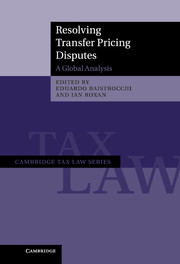Book contents
- Frontmatter
- Contents
- List of figures
- List of tables
- List of contributors
- Acknowledgements
- The Golden Bridge: analytical table of cases by topics in the OECD Guidelines
- Table of Cases
- Abbreviations
- Part I The context of transfer pricing disputes
- Part II North America and Europe
- Part III Asia Pacific
- Part IV BRIC Countries
- 13 Transfer pricing disputes in Brazil
- 14 Transfer pricing disputes in the Russian Federation
- 15 Transfer pricing disputes in India
- 16 Transfer pricing disputes in China
- Part V South America, Middle East and Africa
- Part VI Conclusion
- Index
14 - Transfer pricing disputes in the Russian Federation
from Part IV - BRIC Countries
Published online by Cambridge University Press: 05 November 2014
- Frontmatter
- Contents
- List of figures
- List of tables
- List of contributors
- Acknowledgements
- The Golden Bridge: analytical table of cases by topics in the OECD Guidelines
- Table of Cases
- Abbreviations
- Part I The context of transfer pricing disputes
- Part II North America and Europe
- Part III Asia Pacific
- Part IV BRIC Countries
- 13 Transfer pricing disputes in Brazil
- 14 Transfer pricing disputes in the Russian Federation
- 15 Transfer pricing disputes in India
- 16 Transfer pricing disputes in China
- Part V South America, Middle East and Africa
- Part VI Conclusion
- Index
Summary
Introduction
The economic and business environment in Russia changed significantly following the fall of communism in 1991. Free market reforms (instead of transacting at predetermined regulated prices), opening foreign trade (which was monopolised by the government until then) and introduction of the modern tax system played very important roles in this transition, exposing Russia to the forces of globalisation shaping the modern economic system. Transfer pricing becomes especially important in this context.
However, it would be surprising if transfer pricing in Russia would be a developed concept given that the tax system, in the Western sense of the expression, has only a twenty-year history in modern Russia. However, transfer pricing is an important feature of the Russian tax and political landscape, especially given the commodity bias of the Russian economy.
Following this introduction, this chapter covers the following topics: (ii) economic and institutional context; (iii) historical background of transfer pricing legislation; (iv) overview of the key aspects of the Russian transfer pricing legislation; (v) administrative procedures to resolve transfer pricing disputes; (vi) trends in the domestic court practice on transfer pricing issues; (vii) bilateral and multilateral approaches to transfer pricing disputes; (viii) recent developments in the area of transfer pricing; and (ix) concluding remarks, including the author’s opinion on the likely routes for future developments in this area.
- Type
- Chapter
- Information
- Resolving Transfer Pricing DisputesA Global Analysis, pp. 555 - 583Publisher: Cambridge University PressPrint publication year: 2012



